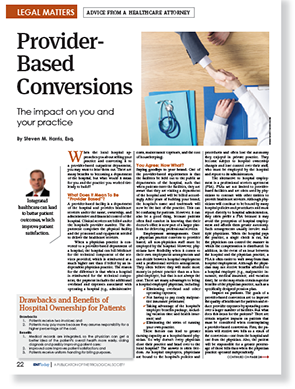
Explore This Issue
December 2015The article “Provider-Based Conversions” (ENTtoday, September 2015) presented little in the way of alternatives to practitioners stressed by the changes in the healthcare “business.” Spending less time practicing medicine, and more time dealing with administrative and financial burdens, it’s easy to see why the constant cry of “Sell or else!” is seductive.
However, it’s important to know that there are alternatives to selling your practice. And if you are being courted by a hospital or system, keep two words in mind: seller beware.
In recent years, financial pressures have convinced hospitals that they must merge into large corporate entities to survive, and that they must acquire physician practices to insure a strong referral base. As a result, hospitals are predatory in their quest for physician services. The business of medicine has emerged as a force that physicians are unprepared to understand or deal with. Hospitals sell these stressed individuals the idea that if they become full-time employees, their troubles are over. No more rent to pay, insurance to acquire, or bills to send out. Utopia is here! Or is it?
But what can physicians do to eliminate the hassle factors without sacrificing autonomy by becoming an employee of a hospital conglomerate?
One solution is for our trade organizations to organize an alternative to the sale of practices by putting a large MSO in place for members to join, which will offer all of the same services that the hospital and corporate predators are selling: EHR systems, billing and collection entities, insurance, practice management, HR, pension planning, etc. This could be done by us, for us. It simply takes vision and leadership. Physicians would still own practices and yet have relief from the hassle factors driving them to a move toward employee status.
A second option is to engage groups that will evaluate and manage your practice for a fee. You will still own your practice but will outsource the hassles so you can focus on practicing medicine.
Third, you can join with other surgeons who are facing similar threats to form surgical groups that share all of the elements required to function (like Ace Hardware).
Finally, organize and communicate with other otolaryngologists in your region who are facing similar threats. These practices can no longer be looked at as a threat—jumping into a lifeboat together will save you and your competitors from the threat of acquisition.
So why do we find ourselves in this situation? Because we, the doctors, have allowed it. We, and our representative trade organizations, failed to see the armada sailing toward us. Is it too late? For some it is. But for many, there is still a chance to take back control of our profession before medicine becomes just another “job” staffed by mid-level shift workers.